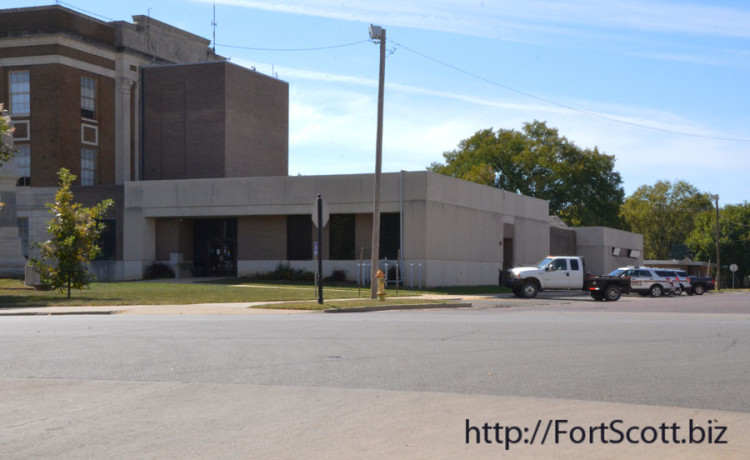
The Bourbon County Sheriff’s Office daily reports can best be viewed on a computer.
Click here, then click on the image.
Agenda
Bourbon County Commission Room
2nd Floor, County Courthouse
210 S. National Avenue
Fort Scott, KS 66701
Tuesdays starting at 9:00
Date: February 27, 2018
1st District-Lynne Oharah Minutes: Approved: ____________
2nd District-Jeff Fischer Corrected: _______________
3rd District-Nick Ruhl Adjourned at: _______________
County Clerk-Kendell Mason
9:00- 9:15 Jim Harris -Asphalt tank trailer
9:30- 9:45 Jim Harris- Application for utility construction for the natural gas line on Maple Road
9:45-10:00 Justin Meek – Kansas Property Tax Lid
10:00-10:15 Travis Sawyer -Car dealership zoning
10:30-11:00 County NRP Program
11:00-12:00 Informational presentation for possible Opioid Crisis
12:00- 1:00 – Commissioners go to Lunch
1:15- 1:30 – Smoking Policy
1:30-2:00 Executive Session Personnel matters of individual non-elected personnel
2:00-2:15 update on Vision meeting
2:15-2:45 Review of fire district KSA 19-3619
2:45 Employee Handbook
Justifications for Executive Session:
Personnel matters of individual non-elected personnel
Consultation with an attorney for the body or agency which would be deemed privileged in the attorney-client relationship
Matters relating to employer-employee negotiations whether or not in consultation with the representative(s) of the body or agency
Confidential data relating to financial affairs or trade secrets of corporations, partnerships, trusts and individual proprietorships
Preliminary discussions relating to the acquisition of real property
Matters relating to the security of a public body or agency, public building or facility or the information system of a public body or agency, if the discussion of such matters at an open meeting would jeopardize the security of such public body, agency, building, facility or information system
The Fort Scott Police Department daily reports can best be viewed on a computer.
Click here, then click on the image to make it larger.

K-State Research and Extension will host events in February and March to help the region’s sheep producers learn more about management techniques.
“The upcoming meetings will range from basic knowledge and skill sets when working with sheep and goats, to health, cost of production, and working with technology,” said Alison Crane, the sheep specialist for K-State Research and Extension. “I believe it is important to not only feel comfortable with the basics of production of small ruminants but also to keep expanding one’s knowledge base to better both the sheep and goat industries.”
On March 3, the Southwind Extension District will host its spring sheep meeting at 3 p.m. in the 4-H Building on the Bourbon County Fairgrounds in Fort Scott. Crane will discuss basic principles of raising sheep and goats, as well as introduce herself to this area of the state.
For more information about the event, contact Chris Petty at 620-223-3720 or [email protected]; or Jennifer Terrell at 620-244-3826 or [email protected].
The Kansas State University Department of Animal Sciences and Industry serves students, livestock producers and the animal and food industries through teaching, research, and education.The K-State ASI department prepares students for careers in the animal and food industries. The curriculum includes the study of nutrition, reproduction, genetics, behavior, meat science and food science with production, management, and agribusiness skills. For more about the K-State’s ASI department visit asi.ksu.edu.
A free tree care workshop will be offered at 6 p.m. March 1 at the Ellis Arts Center at Fort Scott Community College.
Register by Feb. 27 by calling the K-State Extension Office at 620-223-3720.
Workshop topics are:
Fort Scott Community College announced its plan to join a national movement to address smoking and tobacco use on college campuses throughout the U.S.
Fort Scott Community College will ask students, faculty, and administration to support the adoption of a 100 percent smoke-free policy.
“We are truly excited to make Fort Scott Community College a safe, healthy and productive environment,” said Alysia Johnston, Fort Scott Community College President. “The health benefits of reducing secondhand smoke exposure are invaluable and could also help students prepare for the workforce where smoke-free policies are already the norm.”

Over the next 17 months, Fort Scott Community College will engage the campus community to address tobacco use. A task force will be formed to oversee the project, assess tobacco use behavior and attitudes, identify a treatment plan for current smokers and develop a policy. Two students will develop and lead educational efforts to build a movement to become a tobacco-free campus. The policy must be approved by Fort Scott Community College Board of Trustees.
Fort Scott Community College’s efforts are part of a growing trend to clean the air on campuses. Currently, more than 2,100 higher education institutions in the United States have gone smoke- or tobacco-free.
FSCC was one of 18 minority-serving institutions and community colleges that will receive funds and technical support from Truth Initiative®, the nation’s largest nonprofit public health organization dedicated to making tobacco use a thing of the past. The project will be led by Phi Theta Kappa, the honor society on campus. Over the past three years, Truth Initiative has partnered with 135 colleges, reaching more than 1.2 million students and 275,000 faculty and staff across 35 states.
“With 99 percent of smokers starting before age 26, college campuses are critical platforms for preventing young adults from starting tobacco use, aiding those current tobacco users in quitting and reducing exposure to secondhand smoke for all,” said Robin Koval, CEO, and president of Truth Initiative. “We are looking forward to supporting Fort Scott Community College’s efforts to make smoking and tobacco use a thing of the past.”
Today, 38 million Americans ages 18 and above still smoke — including 17.7 percent in Kansas— and tobacco use remains the number one cause of preventable death in this country. Research also shows that there are dire health consequences for non-smokers too. Secondhand smoke exposure causes cancer and cardiovascular disease among other secondhand smoke diseases, which are responsible for more than 41,000 deaths among nonsmoking adults in the U.S.
Minority-serving institutions and community colleges tend to serve students who are at greater risk for tobacco use, including low-income, racial and ethnic minority and first-generation students.
“The grant from Truth Initiative has set us up for success and I’m positive we can achieve our goals,” said Johnston. “We are going to hit the ground running with our plan so that we can finally take a breath of fresh air on campus.”
The Fort Scott Police Department daily reports can best be viewed on a computer.
Click the reports below, then click on the reduced sized reports, the reports should enlarge for viewing.
Continued from last week…
Beth loaded her two kids in her car and drove straight to the neurosurgeon’s office, imploring the receptionist to give her “just two minutes” with him. Between patients when the doctor walked out to see them, Beth stood Antonio on the floor. As the toddler walked clumsily towards the astonished doctor, Beth gave God all the credit.
Today, Antonio (Evan) Guckenberger majors in Exercise Science and is a wide receiver for the Taylor University football team. Because of his deformities as a baby, he was doomed never to walk again, yet today he is recognized for his speed and athleticism.
You’ve gotta smile.
At our retreat, Beth shared another story about a Monterrey, Mexico, orphanage that had run out of food. The kids showed up in the dining room for their evening meal but were told by their guardian that there was nothing to eat. He asked that they pray for God to send food, and just as they bowed their heads, a four-year-old boy raised his hand. “Can we pray for meat?” Surprised by the request, the guardian told him that God certainly was big enough to send meat. While bowing their heads a second time, the same youngster again raised his hand. “What about steak? We never have steak. Could we pray for steak?”
“Yes,” answered the guardian, unable to stifle a laugh. “If God wants us to have steak, we will have steak.” Meanwhile, across the city, unaware of the orphanage’s plight, Beth received a phone call from a stranger. He was in Monterrey for a meat convention that had just ended. (You probably can guess the rest.) The caller had a truckload of steaks he would like to give away, and “someone at the convention center” had given him Beth’s number, telling him of her involvement with the Mexico orphanages. If Beth could meet him, she could have the steaks.
Beth asked Todd, her husband, to drive downtown in his pickup “to load up some steaks.” Todd had questions. What did this man look like? What was he driving? How did Beth know this wasn’t a hoax? She had no answers. With little confidence this would have a happy ending, Todd drove to the destination given and was surprised to have the meat distributor waiting for him. In the meantime, Beth did what she did best: she prayed. If this is legitimate, which orphanage has the greatest need? Immediately the name of an orphanage came to mind, and it was there she had Todd deliver the steaks.
Can you imagine the looks on those kids’ faces when that pickup truck pulled into their driveway with its delivery? Even the guardian admitted he never expected prayer to have an answer of that magnitude.
We serve a God who is so much bigger than we take the time to know. We pray for little because we fail to recognize how much God loves us and wants to meet our needs. Jesus reminded us of that in Matthew 6:26. Look at the birds of the air; they do not sow or reap or store away in barns, and yet your heavenly Father feeds them. Are you not much more valuable than they?
I love how the young orphan’s first idea was to ask God for help. He didn’t cry because he was hungry. He didn’t suggest they hit the streets and beg for money. He didn’t need to.
He knew the bigness of his God.